The desire of many Golden Retriever owners to provide their furry friends with everything they need extends to their diet. This has led to a rise in interest in Homemade Diets for Golden Retrievers. This choice provides a level of control and customization that commercial alternatives simply cannot match. Feeding a homemade diet to your Golden Retriever can have many benefits. This way, you know exactly what ingredients are going into your meals and can respond to any food intolerances or allergies. Why do some owners prefer homemade food? The best part is that you can use fresh, whole ingredients. This avoids the use of artificial preservatives, fillers, and by-products that are often found in commercial snacks. For dogs that are picky eaters or have health issues that require a customized diet, homemade food can make all the difference. It allows you to precisely control the protein sources, carbohydrate selection, and the addition of healthy supplements
However, switching to a regional diet should not be taken lightly. There are several important factors to consider before making any changes. A balanced diet is essential, as dogs require specific amounts of protein, fat, carbohydrates, vitamins, and minerals. Timing is also an important factor, as preparing homemade Food requires dedication and planning. Finally, it is important to consult with a veterinarian or nutritionist to ensure that your Golden Retriever’s nutritional needs are being met. In this blog, you will learn more about this process and find basic nutritional guidelines, safe and healthy recipes, and tips for a smooth transition.
Contents
- 1 Benefits of Homemade Diets for Golden Retrievers
- 1.1 Unmatched Control Over Ingredients:
- 1.2 Avoid fillers and additives:
- 1.3 Personalized nutrition for each stage:
- 1.4 Combat Food Intolerances and Allergies:
- 1.5 Cost Considerations:
- 1.6 Essential Nutrients for a Balanced Homemade Diets for Golden Retrievers
- 1.7 Protein:
- 1.8 Healthy Fats:
- 1.9 Carbohydrates:
- 1.10 Vitamins and Minerals:
- 1.11 Calcium and Bone Health:
- 1.12 Hydration:
- 2 Homemade Dog Food Recipes
- 3 Homemade Dog Treat Recipes
- 4 Homemade Dog Food Preparation and Storage Tips
- 5 Common Mistakes to Avoid When Making Your Own Dog Food
- 6 Should You Supplement?
- 7 Safely Transitioning to a Homemade Diet
- 8 Conclusion
Benefits of Homemade Diets for Golden Retrievers
For Golden Retriever owners who want the best care for their dog, homemade Food is an attractive alternative to commercial dog food. The benefits go beyond preference and include control over ingredients, personalized diets, and even value for money.
Unmatched Control Over Ingredients:
One of the biggest benefits of a homemade diet is that you have complete control over the ingredients. You can handpick fresh, high-quality ingredients and provide your Golden Retriever with the best nutrition possible. Imagine knowing exactly where the chicken, vegetables, and grains in your food bowl come from. That’s a luxury you rarely get with commercial alternatives. This transparency keeps you safe and allows you to choose unprocessed, whole foods.
Avoid fillers and additives:
Commercial dog foods often contain fillers and artificial additives to extend shelf life and enhance taste. These ingredients can be harmful to your Golden Retriever’s health and can cause allergies or digestive problems. When you prepare your own food, you don’t have to worry about this, as you can prepare meals without preservatives, artificial colors, and flavors. This natural approach minimizes the risk of side effects and promotes overall well-being.
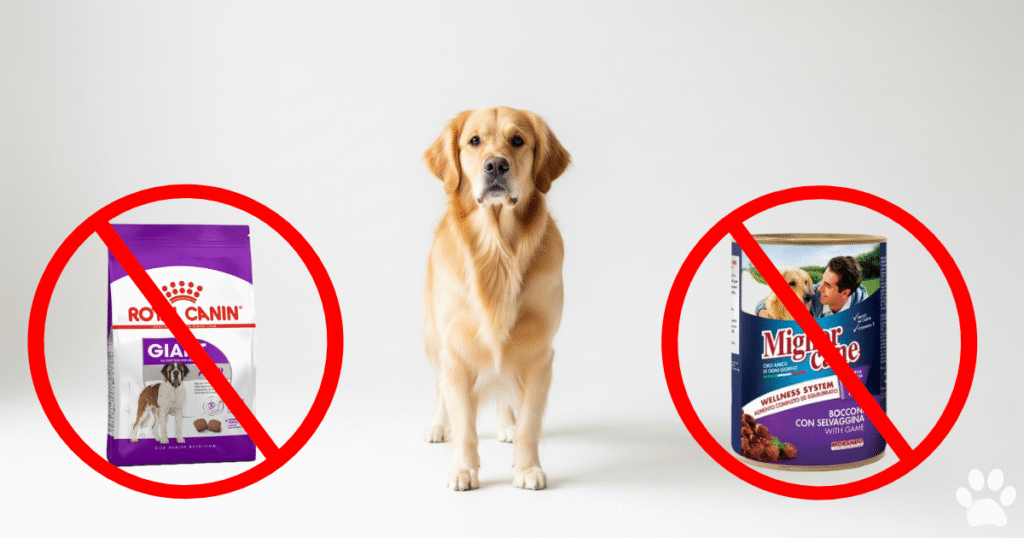
Personalized nutrition for each stage:
Golden Retrievers have different nutritional needs throughout their lives. Puppies need a diet rich in protein and calories to grow, adult dogs need a balanced diet to stay in shape, and senior dogs benefit from nutrients that support their joints. When you formulate your own food, you can tailor the nutrition to your dog’s age, size, activity level, and special health needs. This personalization ensures that they get the exact nutrients they need to thrive at every stage of their life.
Combat Food Intolerances and Allergies:
Many Golden Retrievers suffer from Food allergies or intolerances, making mealtime a constant challenge. A homemade diet allows you to identify and eliminate potential allergens, making mealtime safe and enjoyable. You can easily tailor recipes to specific dietary restrictions and ensure that your Golden Retriever enjoys a balanced, delicious meal without the risk of side effects.
Cost Considerations:
A surprising benefit: Even though you may think homemade Food is more expensive at first, it may actually be cheaper. Buying ingredients in bulk and using seasonal produce can significantly reduce your grocery bill. Plus, you can save money in the long run by avoiding costly vet visits for food-related illnesses.
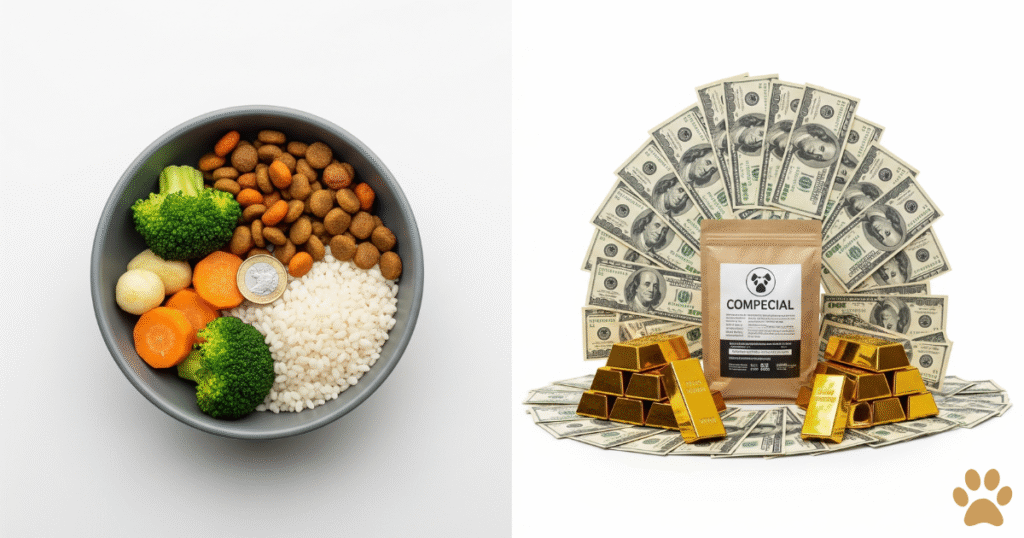
Essential Nutrients for a Balanced Homemade Diets for Golden Retrievers
Preparing a balanced homemade diet for your Golden Retriever is an act of love that ensures he gets the optimal nutrition for his specific needs. However, it is important to understand the essential nutrients he needs to live a healthy, active life.
Protein:
The Foundation of Muscle and Vitality Protein is the foundation of a dog’s diet and is essential for building and repairing tissue, supporting muscle growth, and maintaining overall health. When preparing your own food, choose lean protein sources such as chicken, beef, turkey, fish, and eggs. These provide essential amino acids that are critical to your Golden Retriever’s well-being. Varying protein sources ensures a varied nutrient intake and can help prevent potential food intolerances.
Healthy Fats:
Energy and Coat Health Fats are a concentrated source of energy and play a critical role in maintaining a healthy coat and skin. Include healthy fats in your golden retriever’s diet, such as omega-3 fatty acids found in fish oil and flaxseed. Coconut oil also contains healthy medium-chain triglycerides. These fats support brain function, reduce inflammation, and promote a shiny coat.
Carbohydrates:
Provide sustained energy. Carbohydrates provide your golden retriever with easily accessible energy for an active lifestyle. Choose complex carbohydrates, such as brown rice, sweet potatoes, quinoa, and oats. They provide a sustained release of energy and are rich in fiber, which promotes healthy digestion. Avoid simple carbohydrates and refined grains, as they have little nutritional value and can lead to weight gain.
Vitamins and Minerals:
The Unsung Heroes of Health Vitamins and minerals are essential for many body functions, including immune system support, bone health, and cell growth. Include a variety of vegetables in your Golden Retriever’s diet, such as carrots, spinach, and pumpkin. They contain important vitamins and minerals, as well as antioxidants that protect cells from damage.
Calcium and Bone Health:
Building a Strong Foundation Calcium is essential for bone health, especially for growing puppies and senior dogs. Ensure adequate calcium intake through dairy products (in moderation, as some dogs are lactose intolerant), crushed eggshells, or calcium supplements. Consult your veterinarian about the appropriate supplement, as too much calcium can also be harmful.
Hydration:
The Elixir of Life Hydration is essential for all bodily functions. Provide access to fresh, clean water throughout the day. Moisture-rich foods, such as cooked vegetables and small amounts of broth, can also help maintain hydration.
Homemade Dog Food Recipes
Making your own dog food can be a rewarding and satisfying experience. To help you through the process, we have compiled a few hand-picked recipes tailored to the different life stages and nutritional needs of your Golden Retriever.
Basic Homemade Recipe (for General Feeding)
Ingredients:
- 1 pound boneless
- 1 skinless chicken breast
- Cooked and shredded 1 cup cooked brown rice and 1 cup diced carrots
- Steamed or boiled 1/2 cup chopped spinach
Cooking Instruction
- Boil chicken thoroughly and shred.
- Cook brown rice according to package directions.
- Boil or steam carrots until tender.
- Gently steam spinach.
- Place all ingredients in a large bowl and mix thoroughly.
Suggested Serving Sizes:
- For a mid-adult Golden Retriever
- Start with 2-3 cups per day
- Divided into two servings
- Adjust the amount based on your dog’s weight and activity level.
High Protein Recipe (For Active Golden Retrievers)
Following are High Protien ingredients.
Ingredients:
- 1 pound lean ground beef, cooked and drained
- 1 cup cooked and mashed sweet potato
- 1/2 cup cooked peas
- 1 tablespoon fish oil
Cooking Instructions and Serving Sizes:
- Boil ground beef until tender
- Draining excess fat.
- Boil sweet potato until tender and mash.
- Cook peas until soft.
- Place all ingredients in a bowl and mix thoroughly.
- Add fish oil and mix.
- For very active dogs, feed 3-4 cups per day, divided into two servings.
Grain-Free Recipe (For Dogs with Allergies)
Ingredients:
- 1 pound ground turkey
- Cooked and drained 1 cup pumpkin puree
- 1/2 cup cooked green beans,
- Finely chopped 1 tablespoon coconut oil
Cooking Instruction:
- Cook ground turkey and drain excess fat.
- Use plain pumpkin puree (not pumpkin pie filling).
- Boil green beans until tender.
- Place all ingredients in a bowl and mix thoroughly.
- Add coconut oil and mix.
- Drink 2-3 cups daily, divided into two meals.
Senior Golden Retriever Recipe (For Healthy Joints and a Healthy Heart)
- Ingredients:
- 1 pound cooked salmon
- Flaked 1 cup cooked quinoa
- 1/2 cup fresh blueberries
- 1 teaspoon turmeric
Cooking Instruction and Benefits:
- Boil the salmon and flake it.
- Cook the quinoa according to package directions.
- Place all ingredients in a bowl and mix thoroughly.
- Salmon contains omega-3 fatty acids, which are essential for healthy joints and a healthy heart.
- Omega-3 Fatty Acids in Fish
- Blueberries and turmeric have antioxidant and anti-inflammatory effects.
- Drink 1.5 to 2.5 cups daily, divided into two servings.
Puppy Recipe (for growing Golden Retrievers)
Ingredients:
- 1 lb ground chicken
- Cooked and drained 1 cup white rice
- 1 cup diced carrots
- Steamed or boiled 2 hard-boiled eggs, finely chopped.
Cooking Instructions and Serving Sizes:
- Cook the ground beef well and drain off any excess fat.
- Cook the white rice according to package directions.
- Boil or steam the carrots until soft.
- Boil the eggs and finely chop.
- Place all ingredients in a bowl and mix thoroughly.
- Feed 3-4 meals per day, adjusting portion sizes according to age and weight.
Homemade Dog Treat Recipes
It goes without saying that you should spoil your Golden Retriever with lots of love and attention, but why not extend that affection to his treat bowl, too? Homemade dog biscuits are a great way to give your furry friend a little extra love while providing him with healthy, nutritious snacks. And they’re surprisingly easy to make!
Peanut Butter
Banana Dog Treats These classic treats are a favorite with almost every dog, and they’re super easy to make.
Ingredients:
- 2 cups whole wheat flour (or oatmeal for sensitive stomachs)
- 1/2 cup natural peanut butter (no xylitol)
- 1 ripe banana, mashed
- 1/4 cup water
Instructions:
- Preheat oven to 350°F.
- Combine flour, peanut butter, and banana puree in a large bowl.
- Gradually add water until dough forms.
- Roll out dough on a lightly floured surface and cut out desired shapes.
- Place cookies on a baking sheet lined with parchment paper.
- Bake for 15-20 minutes or until golden brown.
- Allow to cool completely before serving.
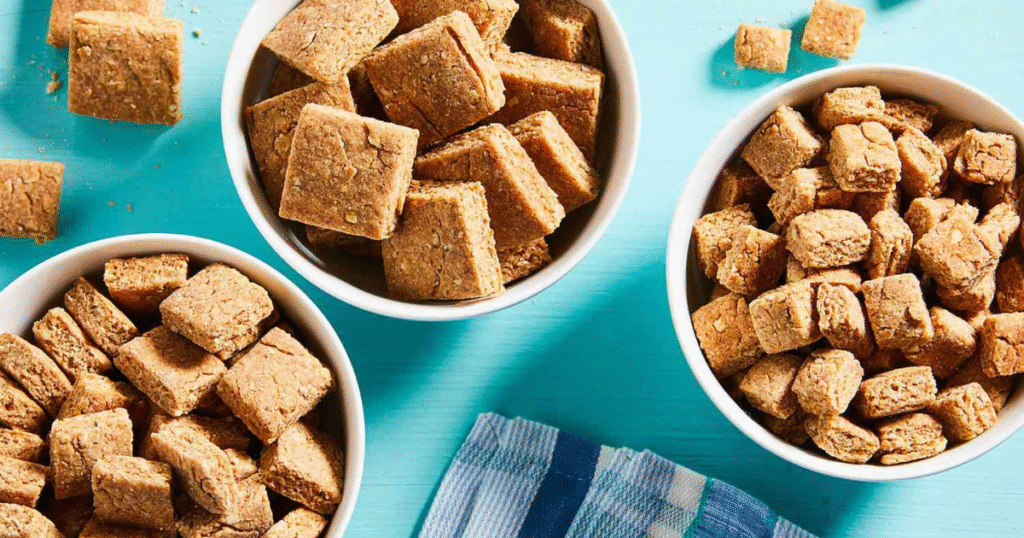
Pumpkin Oatmeal Porridge
Pumpkin is a nutritional powerhouse for dogs, and these oatmeal bites are the perfect healthy snack.
Ingredients:
- 1 cup rolled oats
- 1/2 cup pumpkin puree (not pumpkin pie filling)
- 1/4 cup natural applesauce (unsweetened)
- 1 tablespoon coconut oil (melted).
Instructions:
- Preheat oven to 325°F.
- Combine oats, pumpkin puree and applesauce in a bowl.
- Add melted coconut oil and mix thoroughly.
- Make balls or use mini muffin tins.
- Place on a lined baking sheet.
- Bake for 20-25 minutes or until firm.
- Let cool completely before serving.
Blueberry Frozen Yogurt Treats
These refreshing treats are perfect for hot summer days and are incredibly easy to make.
Ingredients:
- 1 cup unsweetened natural yogurt (Greek yogurt works well)
- 1/2 cup fresh or frozen blueberries
Instructions:
- Place yogurt and blueberries in a blender or food processor.
- Pulse until smooth.
- Pour mixture into ice cube trays or silicone molds.
- Place in the freezer for at least 3-4 hours or until firm.
- Serve frozen as a fresh, healthy snack.
Homemade Dog Food Preparation and Storage Tips
Introducing yourself to the world of homemade dog food is an exciting adventure that will provide your Golden Retriever with a customized and Nutritious feeding experience. However, the success of this project depends on proper preparation and storage techniques. These measures not only ensure the safety and freshness of the meals, but also save you valuable time and effort.
Prepare meals in large batches and freeze them for convenience:
Time is precious, and preparing large batches is your secret weapon for preparing homemade dog food efficiently. Spend a few hours a week preparing large quantities of meals. Divide the prepared food into individual portions that meet your Golden Retriever’s daily needs. Use freezer-safe containers or zip-lock bags to store the food. Label each package with the date and contents to help you keep track of what’s in it. Freezing meals not only saves you time, but also preserves the nutritional value of the food. Defrost food in the refrigerator overnight or use the defrost function on the microwave.
Proper Storage Methods to Maintain Freshness:
It is important to keep homemade dog food fresh to prevent spoilage and ensure that your Golden Retriever enjoys a delicious meal. Cooked food should be refrigerated immediately and consumed within 3 to 4 days. To avoid freezer burn, keep frozen meals at a consistent temperature. Do not leave cooked food at room temperature for too long, as this encourages bacterial growth. Use airtight containers to prevent moisture and odors from penetrating.
Avoid Common Food Preparation Mistakes:
When preparing homemade dog food, it is important to avoid common mistakes that can jeopardize your Golden Retriever’s health. Crossing the street is a common pitfall. Dogs have sensitive digestive systems, and too much salt, pepper, and spices can cause irritation. Never use Toxic ingredients such as onions, garlic, grapes, raisins, chocolate or xylitol. These can cause serious health problems. Always make sure all ingredients are cooked thoroughly to avoid food poisoning.
Vary recipes to ensure a balanced diet:
A balanced diet is essential for your Golden Retriever’s overall health. By regularly changing recipes, you ensure that you are providing a wide range of nutrients. This will also help you avoid monotony and keep meals interesting. Introduce new recipes gradually to avoid digestive problems. For more variety and freshness, you can add seasonal ingredients.
Common Mistakes to Avoid When Making Your Own Dog Food
Making your own dog food is a rewarding endeavor, motivated by the desire to provide your Golden Retriever with the best possible nutrition. However, it also comes with potential pitfalls. It’s important to avoid these common mistakes to ensure your furry friend receives a safe and balanced diet.
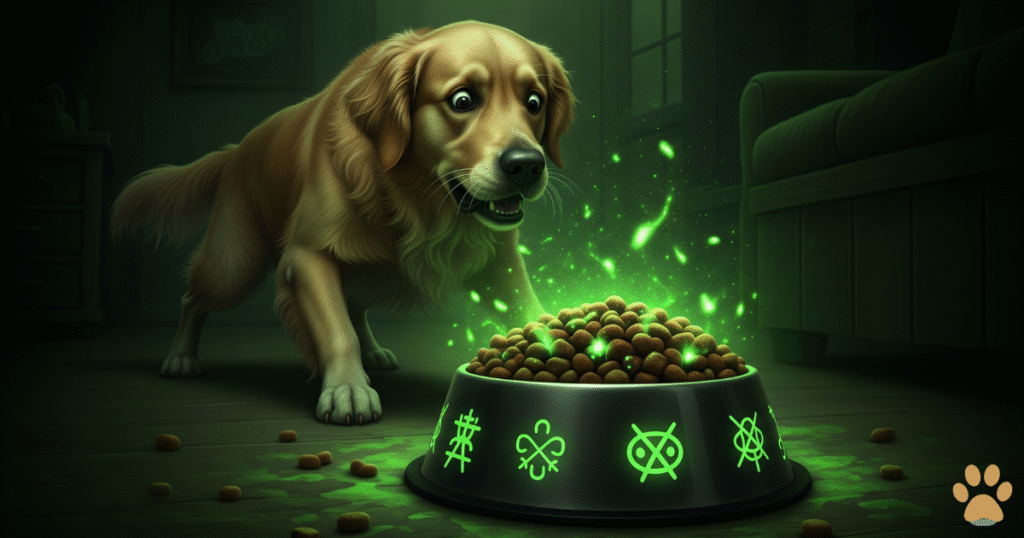
Not Maintaining a Balanced Distribution of Important Nutrients:
One of the biggest mistakes owners make is not maintaining a balance of important nutrients. Dogs need precise proportions of protein, fat, carbohydrates, vitamins, and minerals. Simply mixing ingredients together without taking these factors into account can result in nutrient deficiencies or excesses. Both of these factors can have detrimental effects on your Golden Retriever’s health. For example, a calcium deficiency can lead to bone problems, especially in growing puppies, while too much vitamin A can lead to toxicity. To avoid this mistake, it is important to learn about your dog’s nutritional needs and consult a veterinary nutritionist.
Toxic Ingredients:
This is a non-negotiable aspect of homemade dog food. Some human foods are highly toxic to dogs and should never be included in their diet. Even in small amounts, onions and garlic can damage red blood cells and cause anemia. Grapes and raisins can cause kidney failure. Due to the theobromine content, chocolate can cause seizures and even death. Xylitol, an artificial sweetener, can cause a rapid drop in blood sugar and liver failure. To avoid accidental poisoning, it is important to carefully research safe and dangerous ingredients.
Overfeeding or Underfeeding:
Portion control is important to maintain your Golden Retriever’s ideal weight and prevent obesity or malnutrition. Overfeeding can lead to weight gain, which increases the risk of joint problems, diabetes, and heart disease. On the other hand, underfeeding can lead to nutrient deficiencies and muscle loss. It is important to use a measuring cup and follow the dosage recommendations based on your dog’s weight, age, activity level, and metabolism. By regularly checking your Golden Retriever’s body condition, you will be able to spot any weight changes early.
No Veterinary Advice:
While online resources and cookbooks can provide valuable information, they are no substitute for a veterinarian’s expertise. It is important to consult with your veterinarian before transitioning to a homemade diet. They can assess your Golden Retriever’s individual needs, provide personalized nutritional recommendations, and monitor their health during the transition. They can also help you identify any allergies or sensitivities and recommend appropriate supplements.
Should You Supplement?
While a balanced, homemade diet can provide your Golden Retriever with most of the nutrients he needs, certain circumstances may require supplementation. To ensure optimal health and prevent potential harm, it is important to know when and which supplements to take.
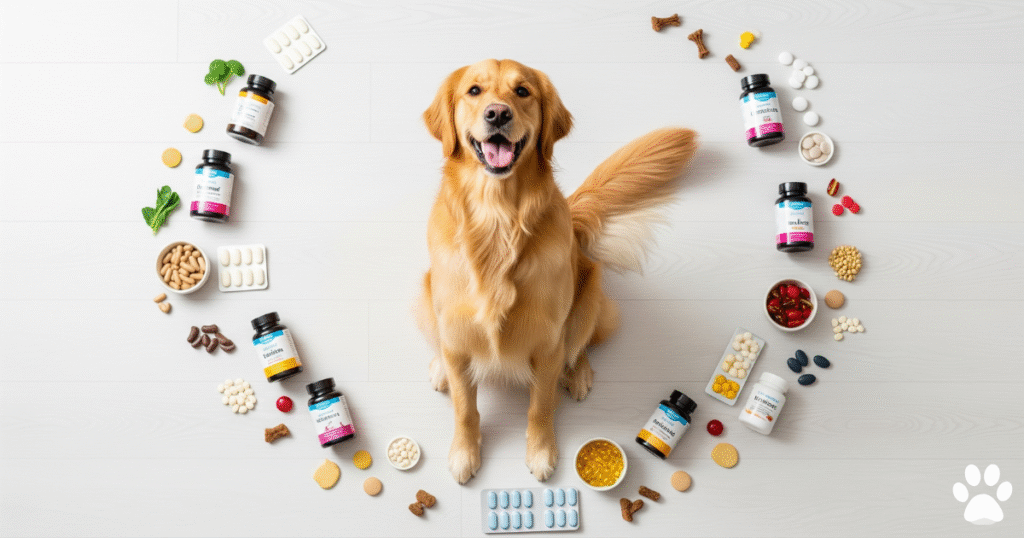
When Supplements Are Needed:
Supplements are often needed for dogs with certain health issues, such as arthritis, allergies, or digestive problems. Growing puppies, pregnant or nursing dogs, and older dogs may also benefit from additional nutrients. If your Golden Retriever is restricted in his diet due to allergies or intolerances, supplements can help fill in any nutritional gaps.
The Best Vitamins and Minerals for Golden Retrievers:
Omega-3 Fatty Acids:
These are important for skin and coat health, joint support, and cognitive function. Fish oil is a popular source.
Glucosamine and chondroitin:
These supplements can promote joint health and mobility, especially in older dogs or those prone to joint problems.
Probiotics:
These beneficial bacteria can promote a healthy gut microbiome, as well as improve digestion and immune function.
Multivitamins:
A comprehensive multivitamin supplement can provide your Golden Retriever with a variety of important vitamins and minerals, ensuring he gets all the nutrients he needs.
Calcium:
Essential for bone health, especially in growing puppies.
How to Choose Quality Dog Supplements:
Consult Your Veterinarian:
Always consult your veterinarian before adding any supplements to your Golden Retriever’s diet. They can assess your dog’s individual needs and recommend appropriate supplements and dosages.
Choose Trusted Brands:
Choose supplements from trusted brands that have been independently tested to ensure quality and safety.
Check the ingredient list:
Read the ingredient list carefully and avoid supplements with artificial additives, fillers, or preservatives.
Pay attention to the form:
Dietary supplements come in different forms, such as powders, capsules, and liquids. Choose a formula that is easy to give to your golden retriever.
Follow dosing instructions:
Follow the dosing instructions provided by the manufacturer or your veterinarian.
Safely Transitioning to a Homemade Diet
Transitioning your Golden Retriever to a homemade diet is a big change. A gradual transition is essential for digestive health and overall well-being. A sudden change in diet can lead to digestive problems. To ensure a smooth and enjoyable transition, follow these steps:
Step-by-step guide to a smooth transition:
Consult your veterinarian:
Consult your veterinarian before you begin preparing a homemade diet. They can assess your Golden Retriever’s individual needs, recommend suitable recipes, and advise on any necessary supplements.
Prepare the new food:
Prepare a batch of your chosen homemade meal, making sure all ingredients are well prepared and safe for dogs.
Gradually mix:
On the first day, mix a small amount of homemade food (about 25%) with your Golden Retriever’s current food (75%).
Increase the proportion:
Over the next 5-7 days, gradually increase the amount of homemade food and decrease the amount of old food. For example:
- Day 2-3: 50% homemade food, 50% old food.
- Day 4-5: 75% homemade food, 25% old food.
- Day 6-7: 100% homemade food.
Monitors your dog’s reaction:
Pay close attention to signs of digestive problems in your Golden Retriever, such as diarrhea, vomiting, or changes in stool consistency. If you notice any problems, postpone the transition or contact your veterinarian.
Signs that homemade food is right for your dog:
Improved digestion:
Your Golden Retriever may have firmer, more regular stools.
Shiny Coat:
The coat becomes healthier and shinier, and hair loss is reduced.
More Energy:
You may feel more energetic and vital.
Improved Overall Health:
You will notice an improvement in your overall health and well-being.
Adjust Recipes Based on Your Dog’s Reaction
Monitor Weight and Body Condition:
Regularly assess your Golden Retriever’s weight and body condition. Adjust portion sizes or recipes as needed.
Be Aware of Sensitivities:
If you notice any signs of allergies or sensitivities, such as: If you experience any problems, such as itchy skin or ear infections, check the ingredients and adjust accordingly.
Veterinary Checkups:
Visit your veterinarian regularly to monitor your dog’s health and adjust his or her diet as needed.
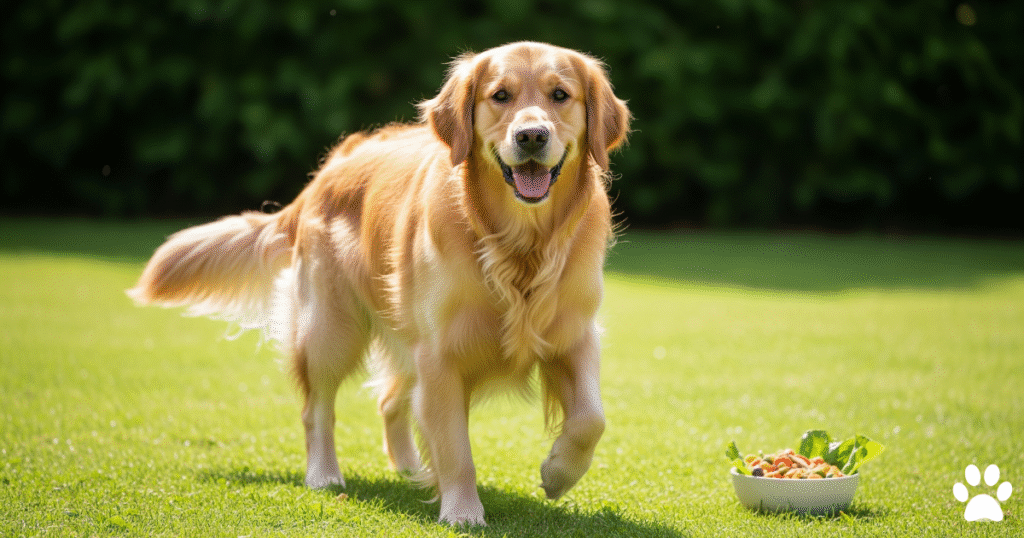
Conclusion
When you prepare your Golden Retriever’s food yourself, you demonstrate that you care about his well-being. There are many benefits to doing so, from having unprecedented control over the ingredients to being able to tailor the food to your dog’s specific needs. By feeding fresh, wholesome food and avoiding artificial additives, you can provide your Golden Retriever with a nutritious, personalized diet. However, Homemade Diets for Golden Retrievers is not an easy task. It requires careful planning, a commitment to balanced nutrition, and a willingness to learn. It is important to consult with a veterinarian or canine nutritionist. This way, you can be sure that your Golden Retriever is getting all the nutrients he needs in the right proportions. Before making a choice, you should carefully weigh the pros and cons. Consider your lifestyle, your dog’s health, and your experience with food preparation and nutrition. If you decide to do this, do it gradually, pay close attention to your dog’s reactions, and be prepared to make adjustments if necessary. Follow us for more Homemade Diets for Golden Retrievers.
Dr. Nabeel A.
Hi, I’m Dr. Nabeel Akram – a farm management professional by trade and a passionate Golden Retriever enthusiast at heart. With years of experience in animal science and livestock care, I’ve built a career around understanding animals—how they live, thrive, and bring value to our lives. This blog is a personal project born from that same passion, focusing on one of the most loyal and lovable breeds out there: the Golden Retriever. Whether I’m managing farm operations or sharing insights on canine health, behavior, and care, it all ties back to one core belief—animals deserve thoughtful, informed, and compassionate attention. Welcome to a space where professional expertise meets genuine love for dogs.
Facebook |
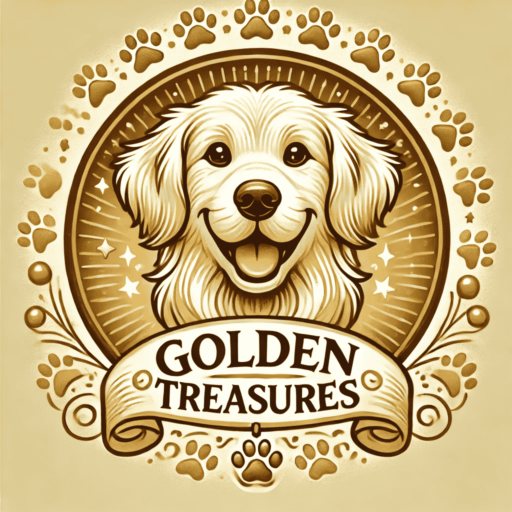
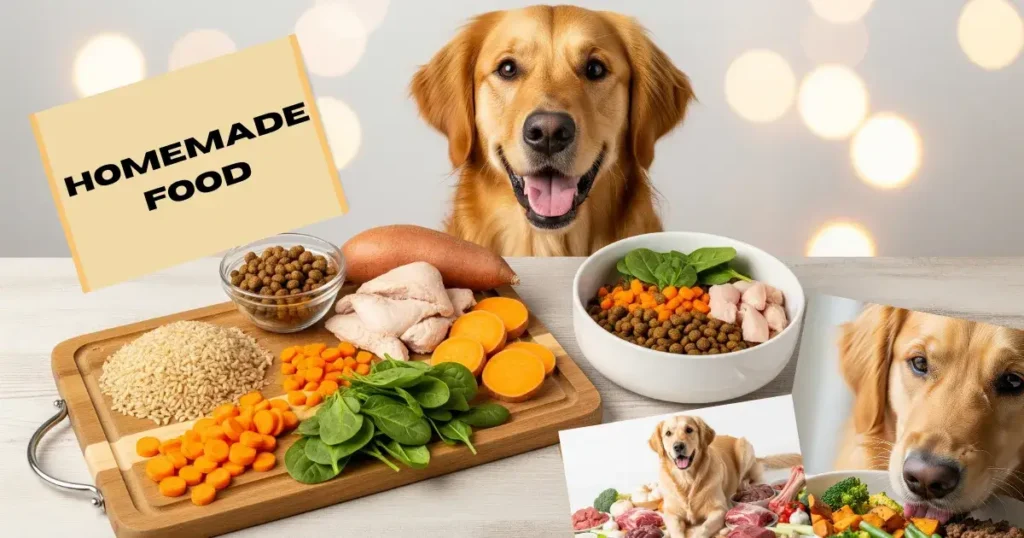
Links will be automatically removed from comments.